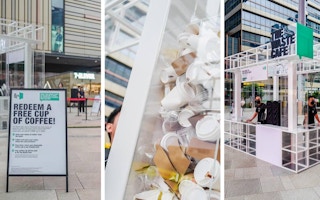A social experiment to raise awareness of waste issues in Singapore has left people scratching their heads over thousands of servings of free coffee that were deliberately served in disposable cups.
To continue reading, subscribe to Eco‑Business.
There's something for everyone. We offer a range of subscription plans.
- Access our stories and receive our Insights Weekly newsletter with the free EB Member plan.
- Unlock unlimited access to our content and archive with EB Circle.
- Publish your content with EB Premium.
A pop-up branded “The Waste Cafe” at a shopping mall on Saturday (28 January) offered complimentary coffee to passers-by, on the condition that they return the used paper and plastic cups, which were then collected and put on display.
Transparent pillars at the booth, measuring about one storey tall and roughly as wide, were seen filling up with the empty cups just three hours into the event, pictures on social media showed. The pillars were completely packed with the receptacles by evening. The pop-up has since been removed from the mall premises.
The event was a tie-up between Singapore’s National Environment Agency (NEA), Starbucks Singapore and the shopping mall, Paya Lebar Quarter, owned by Australian real estate firm Lendlease.
It was part of NEA’s annual “Say YES to Waste Less” public campaign, and the government agency said the social experiment was to showcase how much waste gets generated in a few hours just by using disposable cups. About 2,000 cups were collected in one afternoon, an NEA spokesperson said in response to queries.
The spokesperson added that most feedback on the event was positive and some people said they would be conscious about reducing the use of disposables.
But some online commentators took issue with the event’s concept.
“Wait…but you’re creating waste no?” undergraduate Elois Ng commented on an Instagram post about the event by Paya Lebar Quarter which has garnered over 120 “likes”.
“I feel that [the event] is rather counterintuitive as they seem to be creating a problem to show that a problem exists,” Ng told Eco-Business, adding that food and beverage business owners should be prodded to encourage patrons to bring their own cups instead.
Singapore environmental advocate Woo Qiyun, who runs the Instagram account “The Weird and Wild”, wrote on her page that she could get behind efforts to raise awareness about waste issues, but that this particular activity “could have used some fine-tuning”.
Woo posted a screenshot of her feedback to Clean and Green Singapore, the NEA programme that helmed the campaign, where she also suggested getting eateries to push the use of reusable wares, “rather than [accumulating] more waste to make a statement”.
“If the shock factor is intended, using existing waste rather than creating new waste would have been more impactful,” she said in her comments, adding that the pop-up event “was rather disappointing to see”.
Woo told Eco-Business that the event felt like a “big missed opportunity” to familiarise people with initiatives like deposit return schemes. Such schemes involve consumers paying a deposit on single-use items and getting a refund when the waste is returned for recycling.
Singapore is looking to start such a scheme for beverage containers like plastic bottles and tin cans – though not disposable coffee cups – by 2024. South Korea has had a programme for coffee cups running since last December in some regions.
Woo said people who reacted to her online posts generally appeared confused and surprised by the event.
“While the intention [behind the event] is good and the idea is creative, the execution left much to be desired,” she added.
NEA said the trash collected from the pop-up will be used in roving weekend exhibitions in February and March. In these upcoming events, people will be able to redeem coffee if they bring their own reusable cups, and no takeaway cups will be provided, it added.
Singapore-based advertising agency DSTNCT, which led the conceptualisation of NEA’s “Say YES to Waste Less” campaign, said the upcoming exhibitions will become NEA’s educational resources and could be used for further outreach events, in response to a query on whether the takeaway cups would be recycled after the campaign.
“Our starting point was that it is important to tackle the harsh reality of Singapore’s waste generation,” DSTNCT account director Chloe Lim told Eco-Business. She added that the concept for the pop-up came from seeing trash piling up after a regular office lunch.
“The visual impact of rubbish is affronting and will cause us to reflect on our daily habits,” Lim said.
NEA statistics show that people in Singapore tossed out 200,000 tonnes of disposables in 2020, including beverage containers, bags and utensils. The figure represents over 10 per cent of all domestic waste generated that year.
Meanwhile, the domestic recycling rate has been sliding, hitting 13 per cent in 2020 and staying the same in 2021. The government has a target to pull the figure up to 30 per cent by 2030.
Most of Singapore’s waste is incinerated, in a process that spews carbon emissions. The country’s only landfill, where leftover ash from incineration is stored, is expected to fill up by 2035.








